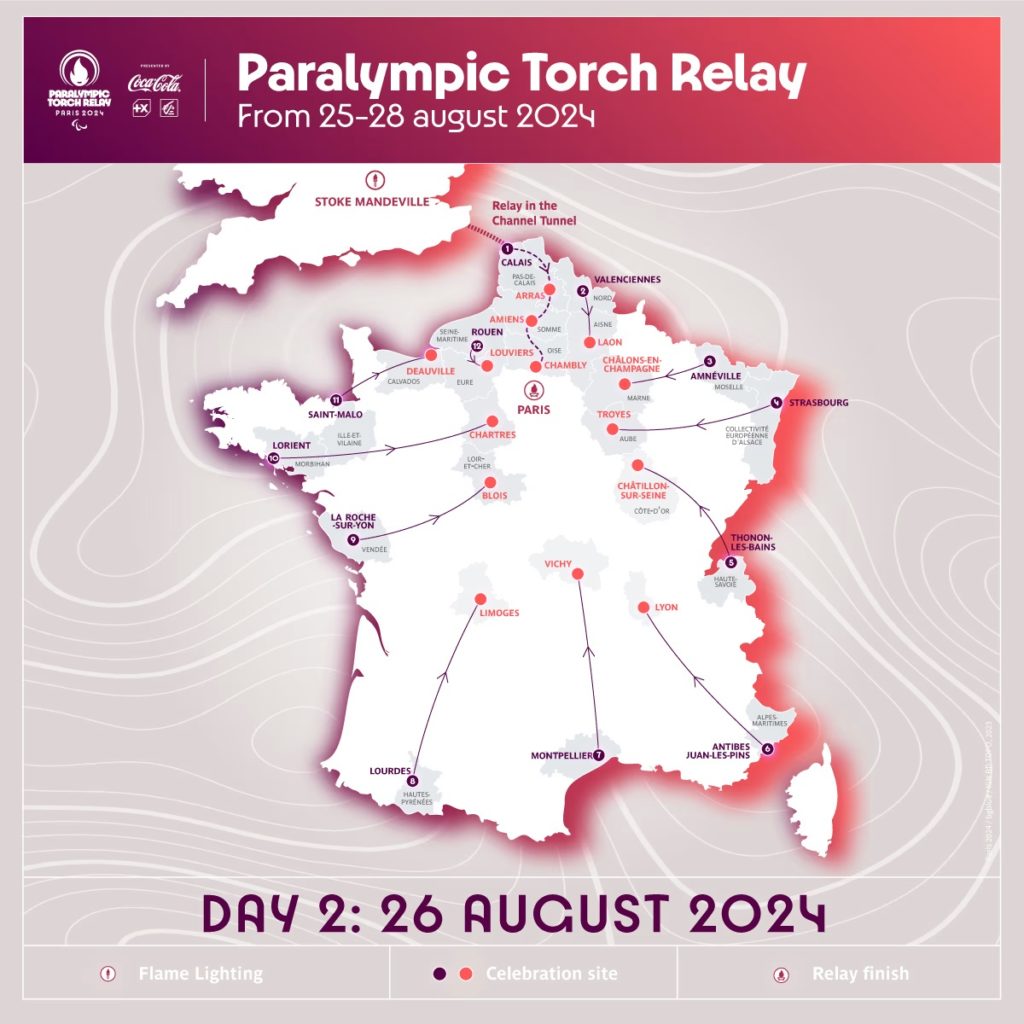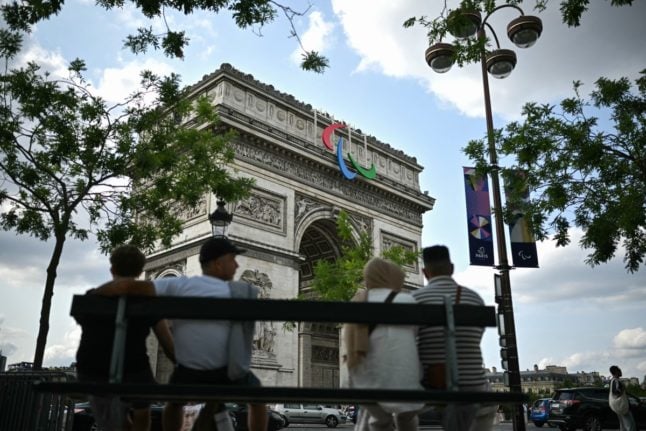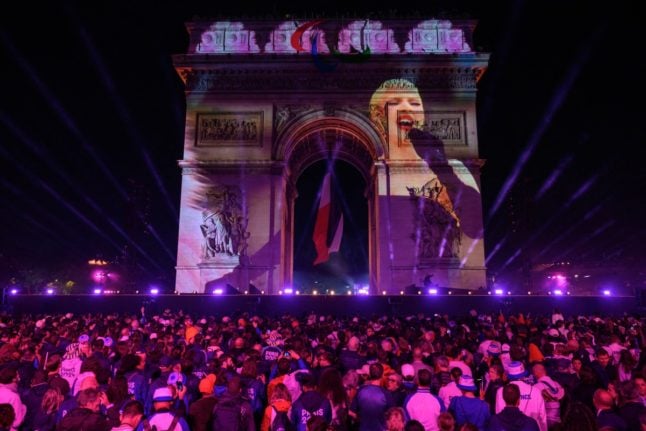The torch was lit at Stoke Mandeville, in England, the historic birthplace of the Paralympic Games.
76 years ago – on the day of the Opening Ceremony of the London 1948 Olympic Games – neurologist Sir Ludwig Guttmann organised the first sports competition for World War Two veterans with spinal cord injuries at Stoke Mandeville Hospital.

After being lit in Stoke Mandeville, the flame crossed the Channel via the Channel Tunnel, marking the start of a legendary relay. A total 24 British athletes will be joined halfway between the United Kingdom and France by 24 French athletes, where the flame will be handed over the flame.
Over the four days, there will be 12 separate flames converging on Paris for the Opening Ceremony in the Champs-Elysées and Place de la Concorde. You can see an interactive map of the full route here.
This will mark the first time the ceremony will be held outside the confines of a stadium for the first time in Paralympic history.
Meanwhile, a separate flame will be lit in the capital on August 25th, as the Paralympic flame arrives at Calais, to commemorate the 80th anniversary of the Liberation of Paris.
READ MORE: What to expect for the 80th Anniversary of the Liberation of Paris
Day 1, August 25
When it arrives on the French coast in Calais, the flame will light 12 separate torches that will then follow individual routes from 12 different locations in France.
One of them will begin in Lorient, home to double Paralympic sailing gold medallist Damien Seguin, and Blois, which has a sports complex named after its Paralympic champion Marie-Amélie Le Fur.
These include;
- Calais, in the Pas-de-Calais département
- Valenciennes, in the Nord département
- Amnéville, in the Moselle département
- Strasbourg, in the European Collectivity of Alsace
- Thonon-les-Bains, in the Haute-Savoie département
- Antibes Juan-les-Pins, in the Alpes-Maritimes département of France
- Montpellier
- Lourdes, in the Hautes-Pyrénées département of France
- La Roche-sur-Yon, in the Vendéed épartement
- Lorient, in the Morbihan département
- Saint-Malo, in the Ille-et-Villaine département
- Rouen, in the Seine-Maritime département
Day 2, August 26
Then the flames will start to make their way toward Paris, passing through places in France with indelible Paralympic links.
For example, a flame will visit Châlons-en-Champagne, which has the only gymnasium in France designed to facilitate access to sport for people with learning disabilities, as well as in Chambly, which has sports facilities adapted for Para sports.
It will also go through the city of Vichy, which has been very active in para sport, having hosted an event marking the 500-day countdown to the Games, as well as introducing a ‘Club Inclusif programme’, which will help existing sporting clubs build awareness on how to include Para athletes, according to the Paralympics information page.
READ MORE: What you need to know about the Paris Paralympics
Here are the towns it will pass through on Day 2;
- Arras (Pas-de-Calais), Amiens (Somme) and Chambly (Oise)
- Laon (Aisne)
- Châlons-en-Champagne (Marne)
- Troyes (Aube)
- Châtillon-sur-Seine (Côte d’Or)
- Lyon
- Vichy
- Limoges
- Blois (Loir-et-Cher)
- Chartres
- Deauville (Calvados)
- Louviers (Eure)
Day 3, August 27
On the third day, the flames will arrive in the capital region, passing through the following towns;
- Montfermeil, Clichy-sous-Bois, Livry-Gargan and Sevran (Seine-Saint-Denis) and Épinay-sur-Seine and Villetaneuse (Hauts-de-Seine)
- Louvres (Val d’Oise)
- Trilport (Seine-et-Marne)
- Sucy-en-Brie (Val-de-Marne)
- Valenton (Val-de-Marne)
- CNSD de Fontainebleau (Seine-et-Marne)
- Garches Vaucresson (Hauts-de-Seine)
- Cergy (Val d’Oise)
- Saint-Quentin-en-Yvelines (Yvelines) and Grigny (Essonne)
- Domaine national de Saint-Cloud (Hauts-de-Seine)
- La Roche-Guyon (Val d’Oise)
- Houdan (Yvelines)
Day 4, August 28
As for the fourth and final day, the flames will arrive inside the city of Paris. They will pass through each of the capital’s 20 arrondissements.
Here are the routes;
- Insep, place de la Nation, place de la République, place de la Bastille and Hôtel de Ville
- Square Léon, la Grande aux Belles and le Jardin Villemin
- La Cipale and the Père Lachaise cemetery
- Passerelle Simone de Beauvoir and the Arènes de Lutèce
- The Parc Monsouris and the Manufacture Nationale des Gobelins
- UNESCO, rue Masseran and Invalides
- Carreau du Temple and Place Pigalle
- Cité des périchaux and the Mairie of the 15th arrondissement
- Club France de la Villette and place des Fêtes
- Avenue de la Grande Armée and the Parc Monceau
- Place du Châtelet and place Saint-Sulpice
- Lac inférieur in bois de Boulogne and the Parc Clichy-Batignolles
Who will carry the torch?
There will be 1,000 torchbearers, and 200 of them will be Paralympians themselves.



 Please whitelist us to continue reading.
Please whitelist us to continue reading.
Member comments